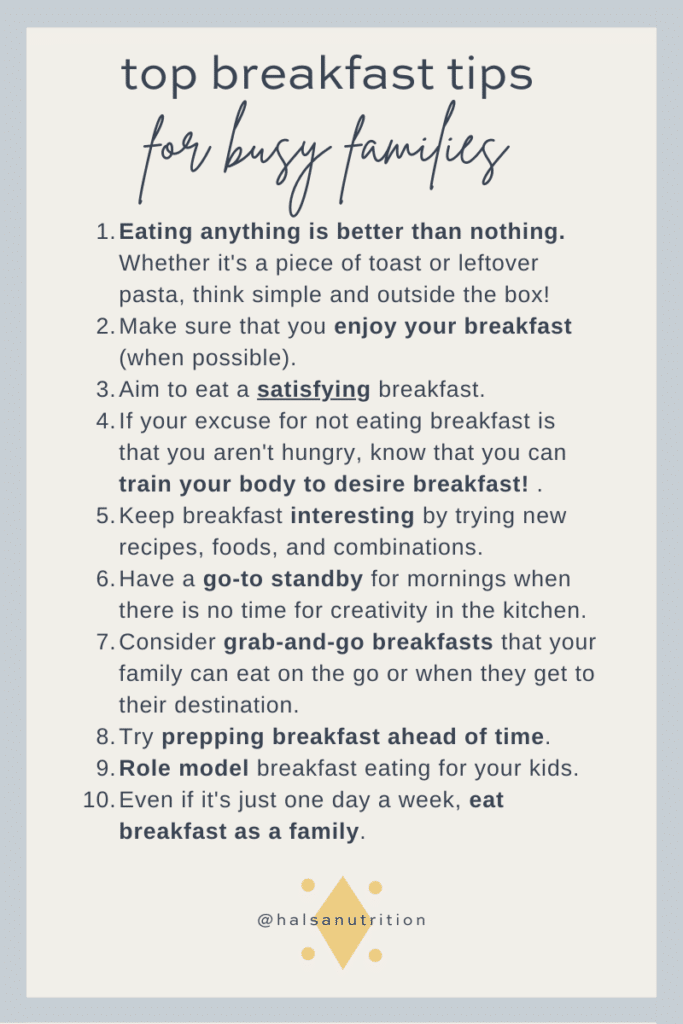
Top Breakfast Tips for You and Your Family
Estimated reading time: 6 minutes
It’s back-to-school time, which means returning to routines and busy schedules and perhaps setting new goals. If one of your goals is to revamp your family’s eating habits, consider starting with the first meal of the day, breakfast. Here are my top breakfast tips, along with information on breakfast’s benefits and what a balanced breakfast looks like.
What are the Benefits of Eating Breakfast?
In today’s busy world, breakfast is often skipped. However, eating breakfast has numerous benefits, including:
- better school performance,
- lowered risk of type 2 diabetes, hypertension, and high cholesterol,
- being more likely to hit daily nutrient targets,
- helping promote optimal fueling for sports.
In addition, many people find that eating breakfast makes them less likely to get over-hungry and overeat later in the day. Staying adequately fueled can also help prevent energy slumps.
Of course, another benefit of breakfast is the pleasure it brings! So be sure to choose foods that you enjoy. A mix of nutrition and pleasure is a good approach when filling your plate.

What Should I Eat for Breakfast?
To make the most of your morning meal, aim to eat a balanced breakfast that includes most* of the following most* of the time:
- carbs with fiber (aim to include whole grains + fruits or veggies)
- protein,
- fat, and
- a calcium source.
A breakfast with fiber, fat, and protein will help you stay full longer and avoid the energy crash that can occur after eating a breakfast that consists primarily of simple carbohydrates or sugar. Rather than counting out grams of fiber or protein, choose foods rich in these nutrients and eat until you feel satisfied.
*Adopting the “most of the time” mentality is essential to intuitive eating. It’s a more reasonable and sustainable approach than diet culture’s all-or-nothing mentality.
What if I Prefer to Skip Breakfast?
How you eat is an individual choice; there is no one right way of eating. Some adults may feel fine when they skip breakfast. However, you will get more nutritional benefits from eating a balanced breakfast. It’s also important to note that kids should not skip breakfast. And because kids pick up on their parents’ habits, it’s ideal for all family members to enjoy this meal.
Adolescents often skip breakfast in favor of sleeping in. You can help encourage your teen’s breakfast habit by having ready-to-go options they can bring and eat on the way to school or at school. Thinking beyond the traditional breakfast opinions can be helpful–the key is that they eat something!
If eating a big breakfast is not for you, consider eating a substantial mid-morning snack. I often refer to my mid-morning snack as “breakfast number 2.” But if eating a mid-morning snack isn’t possible due to school or work, for example, eating a more extensive breakfast is more important.
Top Breakfast Tips For You and Your Family
- Eating anything is better than nothing. So, while green smoothies and veggie omelets are great, the first goal should be ensuring you (and your family) eat something. Whether it’s a piece of toast or leftover pasta, think simple and outside the box!
- The second goal should be to make sure that you enjoy your breakfast! There is no need to force down something you don’t like just because you heard it’s “good for you.” (That said, I recognize that this is a privilege, and for many people, there isn’t an option when choosing what they eat for breakfast).
- When possible, make sure your breakfast is satisfying. Play with different combinations to find what works for you and keep it interesting. For example, what happens when you add fresh berries to your peanut butter toast or cereal? What happens when you fill your breakfast plate with various foods, textures, tastes, and colors?
- If your excuse for not eating breakfast is that you aren’t hungry, know that you can train your body to desire breakfast! Start slowly with anything that sounds appealing, and with continued persistence, you may find yourself a breakfast enthusiast! While intuitive eating entails listening to our body and eating when we are hungry, sometimes our hunger and satiety meters are suppressed from years of dieting, meal skipping, or restricting in other ways.
- Keep breakfast interesting by trying new recipes, foods, and combinations. Consider using a meal plan to rotate the breakfasts that you serve your family.
- Have a go-to standby for mornings when there is no time for creativity in the kitchen. Milk, cereal, eggs, peanut butter toast, yogurt, and granola are tried and trusted options at our house.
- Consider grab-and-go breakfasts that your family can eat on the go or when they get to their destination. Overnight oats, egg sandwiches, yogurt parfaits, and smoothies are good options.
- Try prepping breakfast ahead of time. Overnight oats, oatmeal bakes, frozen breakfast burritos, and mini frittatas make great prep-ahead breakfasts.
- Role model breakfast eating for your kids. They may be more likely to stick with this habit if it’s part of your routine, too.
- Even if it’s just one day a week, eat breakfast as a family. While family dinners are often held up as the ideal time to eat together–any meal counts and makes a difference!

Additional Resources
If you need inspiration for breakfast, see this post and consider buying my breakfast e-book. It was updated with new tips and information this past summer.
If you want more individualized help, let me know. I can help you create a breakfast plan that works for your family and even provide a customized weekly meal plan with recipes and a grocery list!
Other Posts You Might Like
- The Joy of Food: Why Eating for Health Isn’t Always the Most Important Thing
- 7 Key Concepts of Mindful Eating
- Non-diet SMART Goals for Improved Well-being
- Nourished Eating for Teens – A Visual Approach
- The Division of Responsibility
About the Author
Maria Adams, MS, MPH, RDN, LDN, a registered dietitian and Certified Intuitive Eating Counselor. Maria takes a weight-inclusive approach and helps individuals rediscover the joy of food, learn how to nourish to feel their best and heal from chronic dieting and disordered eating. She holds a Bachelor of Science Degree in Nutrition Science, a Master of Science in Nutrition Communication, and a Master of Public Health.
Leave a Reply